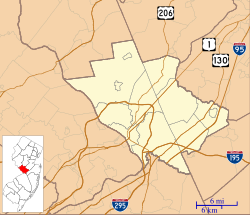This article includes a list of general references, but it lacks sufficient corresponding inline citations. (May 2016) |
Colonial Club | |
 | |
| Location | 40 Prospect Ave, Princeton, New Jersey |
|---|---|
| Coordinates | 40°20′55.8″N 74°39′10.1″W / 40.348833°N 74.652806°W |
| Built | 1906 |
| Architect | Robert W. Gibson and Francis G. Stewart |
| Architectural style | Colonial revival |
| Part of | Princeton Historic District (ID75001143[1]) |
| Added to NRHP | 27 June 1975 |
Colonial Club is one of the eleven current eating clubs of Princeton University in Princeton, New Jersey, United States.[2] Founded in 1891, it is the fifth oldest of the clubs. It is located on 40 Prospect Avenue.
A private social club for undergraduates at Princeton University, the club was referred to as "flamboyant Colonial" in F. Scott Fitzgerald's debut novel, This Side of Paradise, and was defined as being one of the "top five" clubs along with Ivy, Cottage, Cap & Gown, and Tiger Inn. As the first eating club to both abandon the selective bicker process and become coeducational in 1969, Colonial Club has been heralded for its progressive legacy.[3]
Colonial Club has been affiliated with over 7 Rhodes Scholars and several Valedictorians of Princeton University. Among the Princetonians who were involved in the World War II code-breaking at Bletchley Park, some were allegedly from Colonial Club.[4]
The club has served as the primary social scene for several notable alumni during their undergraduate years, including former Colonial Club Vice President Joseph Nye '58, co-founder of the international relations theory of neoliberalism, Pete Conrad '53, third man to walk on the Moon, Eric Schmidt '76, executive chairman of Alphabet Inc. and former CEO of Google, and Ted Cruz '92, U.S. Senator and candidate for the Republican nomination for President of the United States in the 2016 election.
- ^ "Princeton Historic District". National Register of Historic Places. National Park Service.
- ^ Hu, Winnie (July 29, 2007). "More Than a Meal Plan". The New York Times. Retrieved 2008-10-06.
- ^ "The Eating Clubs of Princeton University: Colonial Club".
- ^ "Princetonians in the Ultra Service". Princeton Alumni Weekly. May 27, 1975.


